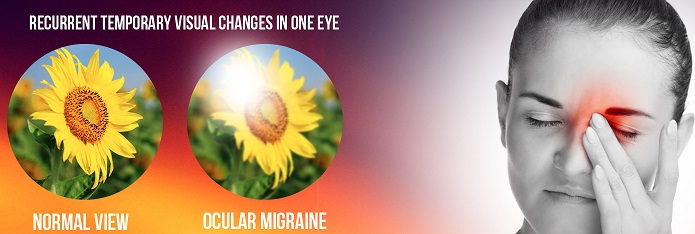
IN THIS ARTICLE
- Symptoms
- Causes
- How It's Diagnosed
- Treatment
What is Optical Migraine or Ocular Migraine?
Whenever we talk about Migraines we tend to imagine about pounding and disabling headaches but when we talk about optical migraine or ocular migraine, this is a condition in which the affected individual does not have any pain but has visual disturbances affecting one or both eyes. Optical migraine or ocular migraine may scare the wits out of a person but it is normally a benign condition and resolves without the need for any treatment in about half an hour. Optical migraine or ocular migraine is also known by the names of ophthalmic migraines. If optical migraine or ocular migraine is followed by a severe headache then that condition is called as Migraine with Aura and the Optical Migraine or Ocular Migraine is termed as an aura preceding a headache. Optical Migraine or Ocular Migraine can be followed by a headache or it may occur after a migraine headache.
See your doctor to find out if you have ocular migraines. He can rule out other conditions that can cause similar symptoms. Be ready to describe your symptoms as completely as you can that will help your doctor know what’s really going on.
Symptoms
Warning signs of an ocular migraine include:
Vision problems that affect one eye, such as flashing lights, blind spots in your field of vision, or blindness. You might have them for only a few minutes or up to 30 minutes. These problems affect just one eye, which makes ocular migraines different from other types.
It can be hard to tell the difference between flashing lights or blindness in one side of your vision -- but involving both eyes -- and having these symptoms in only one eye. If you can’t tell, cover one eye and then the other.
Surprising Reasons You're in Pain
Headache that lasts from 4 to 72 hours. It tends to:
- Affect one side of your head
- Feel moderately or very painful
- Throb or pulsate
- Feel worse when you move around
Other symptoms include:
- Nausea
- Vomiting
- Being sensitive to light or sound
Causes
Experts aren't sure what causes ocular migraines. Some feel that the problem is related to:
- Spasms in blood vessels in the retina, the lining in the back of the eye
- Changes that spread across the nerve cells in the retina
- Genetics: Genetics play a vital role in the development of Optical Migraine or Ocular Migraine. If there is a family history of Optical Migraine or Ocular Migraines then there are higher chances for that individual to have this condition.
- Hormones: Hormones also play a role in development of Optical Migraine or Ocular Migraine. The female hormone estrogen which is responsible for controlling chemicals in the brain that affect pain sensation is the hormone responsible for development of Optical Migraine or Ocular Migraine. This is the reason why females complain more of migraine headaches with aura as they are more prone to hormone irregularities due to menstrual cycles, pregnancy and menopause.
- Triggers: Certain triggers also play a role in development of Optical Migraine or Ocular Migraine. The triggers may be different for different people. Some of the common triggers that can cause Optical Migraine or Ocular Migraine are:
- Bright lights
- Loud sound or noise
- Perfumes or deodorants
- Stress
- Weather changes
- Alcohol
- Caffeine
- Certain foods.
It’s rare, but people who have these migraines may have a higher risk of permanent vision loss in one eye. Experts don't know if medications that prevent migraines -- such as tricyclic antidepressants or anti-seizure medications -- can help prevent that vision loss. But if you have ocular migraines, even if they go away on their own, it’s a good idea to talk to your doctor about your symptoms.
How It's Diagnosed
Your doctor will ask you about your symptoms and examine your eyes. He’ll try to rule out other conditions that could cause similar problems, such as:
- Amaurosis fugax, temporary blindness due to a lack of blood flow to the eye. It can happen because of a blockage in an artery that leads to the eye.
- Spasms in the artery that gets blood to the retina
- Giant cell arteritis, a problem that causes inflammation in blood vessels. It can lead to vision problems and blindness.
- Other blood vessel problems related to autoimmune diseases
- Drug abuse
- Conditions that keep your blood from clotting normally, like sickle cell disease and polycythemia
Treatment
Ocular migraines usually go away on their own within 30 minutes, so most people don’t need treatment for them. It’s best to stop what you’re doing and rest your eyes until your vision goes back to normal. If you have a headache, take a pain reliever that your doctor recommends.
There's been little research on the best way to treat or prevent ocular migraines. But, your doctor may recommend one or more meds:
- Aspirin
- Drugs that treat epilepsy, such as divalproex sodium (Depakote) or topiramate (Topamax)
- Tricyclic antidepressants, such as amitriptyline (Elavil) or nortriptyline (Pamelor)
- Blood pressure medicines called beta blockers
Sources:
Make your appointment today
To make your appointment, simply give us a call (760)-948-3345 or
or
Due to COVID-19 safety protocols, all eyewear services are currently by appointment only. Please call to make an appointment.
At Golden Eye Optometry, we view good vision care as front line protection at every age. A routine eye exam can detect more than poor vision. It can shed early light on glaucoma, macular degeneration, cataracts and diabetes.